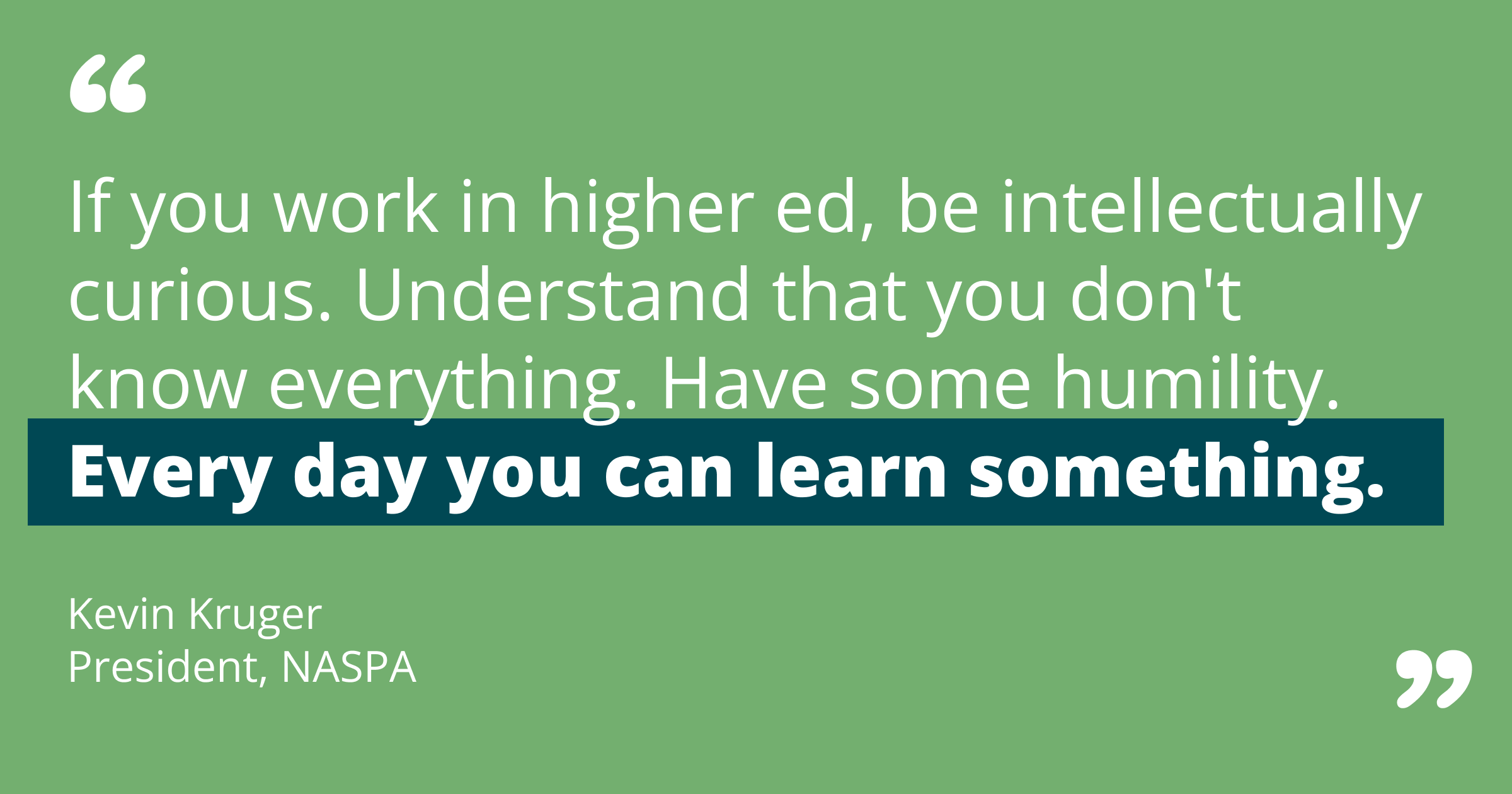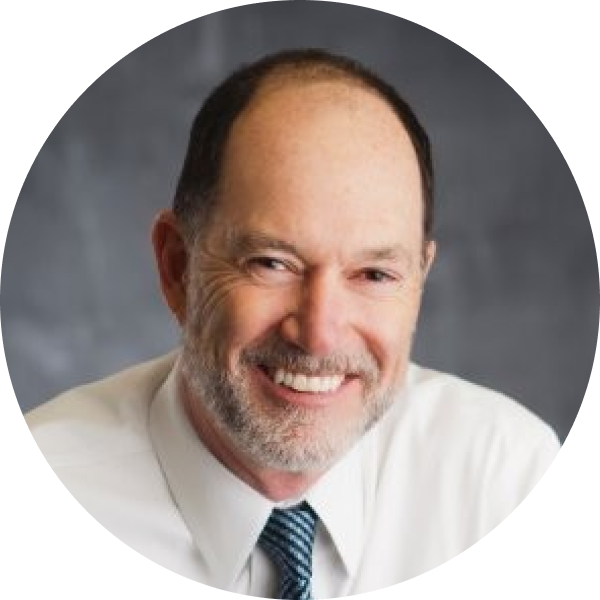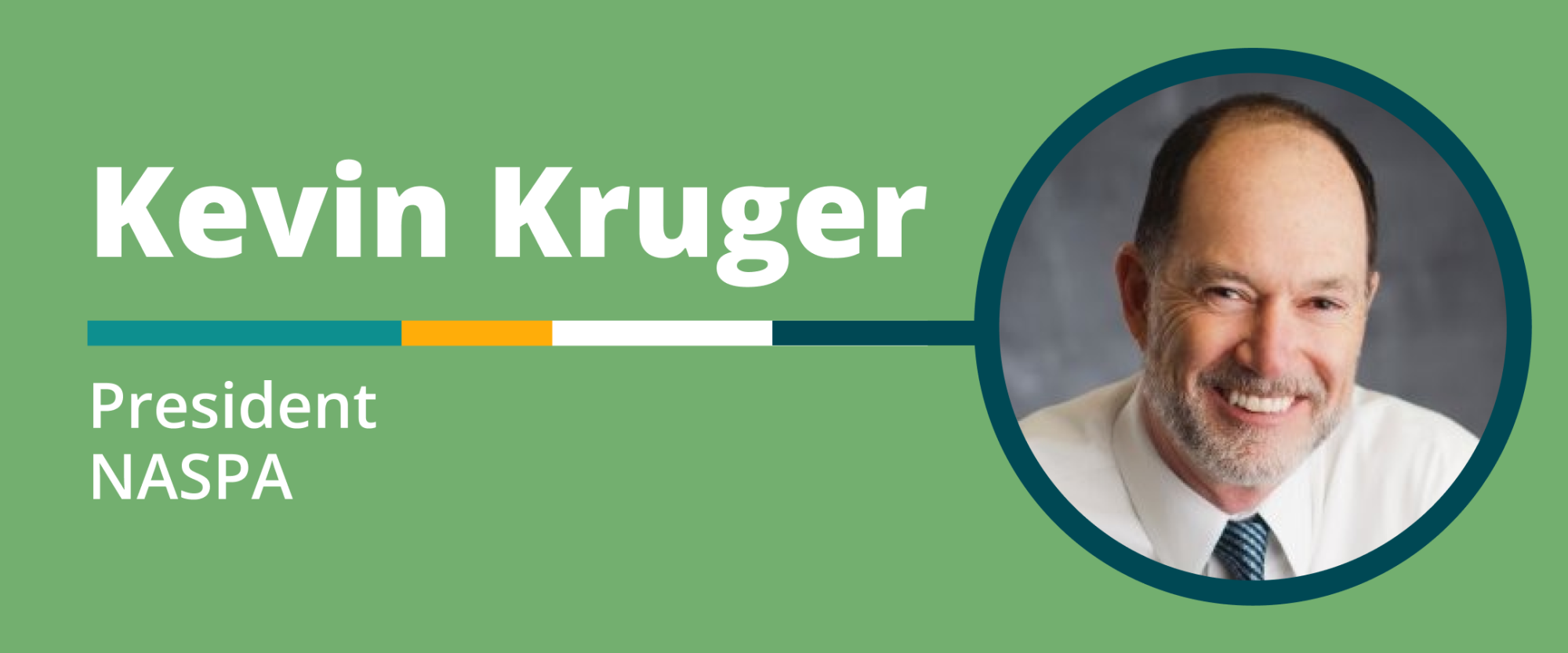The National Association of Student Personnel Administrators (NASPA) addresses the student experience beyond academics, which makes this organization a natural partner for the UIA. When Dr. Kevin Kruger, NASPA’s president and CEO, announced his retirement, The Innovating Together Podcast offered an opportunity to review his career as he discussed the pleasures and pressures of leadership, how he’s approached his position, his recommendations for practicing and upcoming leaders, and how to prepare for a sea change in higher education.
How (and Why) Higher Ed Leaders Retire
The UIA shares NASPA’s vision that student learning and development extend beyond the classroom to permeate the full higher ed experience. Dr. Kruger has been our partner for ten years, and we were sad to learn that he’s retiring from his longtime leadership position. He began by admitting:
“I have one of the best jobs in higher ed. But it's time for someone else to have a shot at it. I want to do things that are more personal and self-fulfilling. Leadership jobs take an enormous amount of attention, energy, and as you move into a later part of your life, it gets harder.”
What will he miss about running the world’s largest professional student affairs association?
“Every day, I make decisions. I get on a stage in front of sometimes 6,000 people. You try to keep some humility, but you get a lot of accolades. That switch gets turned off on July 1st. A good question is, ‘Without the buzz, what's your day going to be like?’ Right now, it seems joyful and glorious, but ask me in six months, ‘How's that been, not being in charge?’"
We were happy to hear that Dr. Kruger won’t disappear:
“I want to continue to have a voice, but not the responsibilities that come with being a CEO. To some degree, there are constraints about what I can say. Yet after 45 years in higher ed, I have a lot to say. So, I am looking for some lanes where I can be a little bit more provocative.”
He won’t miss the pressures of supervision, budgeting, strategic planning, and travel, a slate of responsibilities that can reach their worst-case potential during crises such as the pandemic:
“Imagine a row of spigots, the resources that allow the engine to run for my organization. And then in one hour, we turned them all off and had to think about how we're going to still serve the profession and keep people employed. That's a huge responsibility. I was up almost every night at 2:00 AM trying to think how do we pivot? How do we serve our members' needs and don't charge them anything? There was this psychic impact on all of us who went through that. But what saved me were colleagues. We got ourselves through COVID by having that support network. You have to have people that you can trust and rely on.”
The Craft of Higher Ed Leadership
As Dr. Kruger reflects on his long career, he shared how he defines it and how he learned to practice it:
“I think about leadership as a craft, in the same way that an actor, musician, or artist works on their craft all the time. You learn from your mistakes. It's a constant process. One of the biggest lessons I’ve learned is there is an infinite amount of sunshine, and as the CEO, the best thing I can do is to provide opportunities for other people to have that sunshine. I see people hoarding control or credit or whatever it might be. I don't feel threatened by other people's success and visibility.
“Amelia Parnell, our new CEO, was my VP for Research and Policy for nine years. She has her own contacts, research, visibility, and speeches that enabled NASPA to be a better organization. Instead of seeing that as somehow taking away from me, I see it as developing her own voice.”
By watching others, he also learned that any presidency comes with a megaphone:
“I had this metaphor about the megaphone sitting on the desk and a choice about whether to exercise my voice or just sit on the side. I watched how successful leaders use their voice for good, to represent a position or people that didn't necessarily have a voice. I could say things that can't be said on a college campus. Look at the DEI/anti-DEI world that we're in. I'm going to speak out about some of the worst legislation I've ever seen in higher education. But a vice president of student affairs at a university can't, no matter what their opinion might be. I learned that that was a responsibility that came with the job.”
The UIA has fond memories of former UMBC President Freeman Hrabowski, and Dr. Kruger shared a few of his own:
“I worked for Freeman in the ‘90s. I remember he would pick up pieces of trash when he was walking around campus, without any fanfare. He would just stuff them in his pocket. And he'd say hello to everybody and engage students: ‘What's your name? What's your major? What's your GPA?’ He would try to get at how they were doing and then provide support. I learned two things as a leader from watching him. You're never too important to do any job. I'll crawl under a table, hook up wires, whatever the job might be. Second, my profession is filled with young people, so I engage every one of them. They have my email, I'll answer a phone call. Never get too impressed with yourself that you don't connect with the most important people, those you’re serving and who are actually doing the work.”
Advice for Current and Rising Leaders
One leadership skill that we admire is the ability to give inspiring, useful advice. Dr. Kruger shared four good suggestions with us:
“If you're going to work in higher ed, be intellectually curious and understand that you don't know everything. Have some humility. Every day, you can learn something about the business. You've got to have a team of people alongside you that you can trust. So, build a strong team. Hire good people and retain them.

“If you’re getting paid to make decisions, understand the budget. What's the book, A CEO Only Does Three Things? It's the vision, the people, the money. You have to understand how the wheels run in these organizations and how to keep them solvent and afloat. So, I'm constantly reading. I read books on leadership and strategic budgeting. And then learn from your colleagues.
“The luxury of specialization is a phase of higher education that's probably coming to an end. We’ve built an infrastructure at universities that some people call silos. They're vertical. And that's just not sustainable. What I tell young people is the future is being a generalist. Have a wide set of skills. Use your early years to become as well-versed as possible in many aspects of student affairs or other aspects of the institution. That will make you a more competitive employee.
“If you choose higher ed, you're choosing a value-centered career. If money is your most important thing, go work for Google, Amazon, or IBM. Very few opportunities in your life do you get to change the trajectory of an individual. When you get a first-generation student to the finish line, that has multi-generational impact, right? So, you should get joy and meaning from that. And that's a sacrifice. But the basic premise is this is value-centered work, and it's a privilege to have that opportunity.”
How to Prepare for Changes in Higher Ed
Several times in our conversation, Dr. Kruger referred to an oncoming change in the higher ed sector. Here’s how he spelled it out:
“We are in the early stages of a higher ed recession. You see it everywhere. And if you understand that, then you think differently about the next five years, because if you know that resources are going to be heavily constrained, and we're going to be cutting program. If you know that's the environment, wouldn't you think differently about your own institutional strategic planning for the next five years? I think that scarcity can be an opportunity, because it can provide the motivation to do some things that maybe you couldn't have done before.”
Some of Dr. Kruger’s insights can be attributed to his two hours of reading at the start of every day. In addition to Trey Taylor’s A CEO Only Does Three Things, he left us with two more suggestions:
“I just finished Adam Grant's A Hidden Potential. I think it's awesome. It talks about how people achieve great things. And this could be a little bit of inside baseball, but Marjorie Hass' book Women in Higher Education was excellent. As a white male leader who works in a very feminine profession, it's been instructive for me to understand how people view women's leadership, particularly in higher ed. That was just an awesome book, as well. So those are two recent reads that have struck me.”
Note: This interview in the Weekly Wisdom Series originally aired on May 20, 2024 as part of the University Innovation Alliance’s Innovating Together Podcast, appearing live on Facebook, Twitter, and LinkedIn.
Resources Mentioned in this Episode
- National Association of Student Personnel Administrators (NASPA)
- Amelia Parnell (new president of NASPA)
- University of Maryland, Baltimore County (UMBC)
- Freeman Hrabowski (former longtime president of UMBC)
- A CEO Only Does Three Things: Finding Your Focus in the C-Suite by Trey Taylor
- A Hidden Potential: The Science of Achieving Greater Things by Adam Grant
- A Leadership Guide for Women in Higher Education by Marjorie Hass
- Dr. Kevin Kruger: LinkedIn
Bios of Guest and Co-Hosts

Dr. Dr. Kevin Kruger draws on more than 40 years of experience in higher education. Since 2012, he has served as president and CEO for NASPA – Student Affairs Administrators in Higher Education, the organization’s first executive-level president. He has represented NASPA in national forums such as the Washington Higher Education Secretariat, which includes the leaders of approximately 50 higher education associations. Prior to his role as president, Dr. Kruger worked for 18 years as the associate executive director and served as the chief operating officer (COO) and chief financial officer (CFO) for NASPA. He has held a range of student affairs positions at Southern Methodist University and the University of Maryland. As NASPA president, Dr. Kruger represents student affairs at a variety of national forums and is a frequent contributor to higher education news stories on the college student experience. He has published and presented nationally and globally on using technology in student affairs administration, international education, trends in higher education, student success, degree-completion strategies for low-income/first-generation students, and change management and leadership in higher education. He is the proud father of two children, one a recent college graduate and the other a college sophomore. Dr. Kruger received his M.A. and Ph.D. in Counseling and Personnel Services from the University of Maryland.

Co-Host: Bridget Burns, Executive Director, University Innovation Alliance
Dr. Bridget Burns is the founding Executive Director of the University Innovation Alliance (UIA). For the past decade, she has advised university presidents, system chancellors, and state and federal policy leaders on strategies to expand access to higher education, address costs, and promote completion for students of all backgrounds. The UIA was developed during Bridget’s tenure as an American Council on Education (ACE) Fellowship at Arizona State University. She held multiple roles within the Oregon University System, including serving as Chief of Staff and Senior Policy Advisor, where she won the national award for innovation in higher education government relations. She was a National Associate for the National Center for Public Policy and Higher Education, and has served on several statewide governing boards including ones governing higher education institutions, financial aid policy, and policy areas impacting children and families.

Co-Host: Doug Lederman, Editor and Co-Founder, Inside Higher Ed
Doug Lederman is editor and co-founder of Inside Higher Ed. With Scott Jaschik, he leads the site's editorial operations, overseeing news content, opinion pieces, career advice, blogs and other features. Doug speaks widely about higher education, including on C-Span and National Public Radio and at meetings and on campuses around the country. His work has appeared in The New York Times and USA Today, among other publications. Doug was managing editor of The Chronicle of Higher Education from 1999 to 2003, after working at The Chronicle since 1986 in a variety of roles. He has won three National Awards for Education Reporting from the Education Writers Association, including one for a 2009 series of Inside Higher Ed articles on college rankings. He began his career as a news clerk at The New York Times. He grew up in Shaker Heights, Ohio, and graduated in 1984 from Princeton University. Doug and his wife, Kate Scharff, live in Bethesda, MD.
About Weekly Wisdom
Weekly Wisdom is an event series that happens live on Facebook, Twitter, and LinkedIn. It also becomes a podcast episode. Every week, we join forces with Inside Higher Ed and talk with a sitting college president or chancellor about how they're specifically navigating the challenges of this moment. These conversations will be filled with practicable things you can do right now by unpacking how and why college leaders are making decisions within higher education. Hopefully, these episodes will also leave you with a sense of optimism and a bit of inspiration.
Rate, Review & Subscribe
Learn why hundreds of people have rated this new podcast 5 stars! Please join others and rate and review this podcast. This helps us reach and inform more people -- like you -- to help increase the number and diversity of college graduates in the United States.
Click here, scroll to the bottom, tap to rate with five stars, and select “Write a Review.” Then be sure to let us know what you loved most about the episode! Also, if you haven’t done so already, subscribe to the podcast. We’ll be adding a bunch of bonus episodes to the feed and, if you’re not subscribed, there’s a good chance you’ll miss out.

